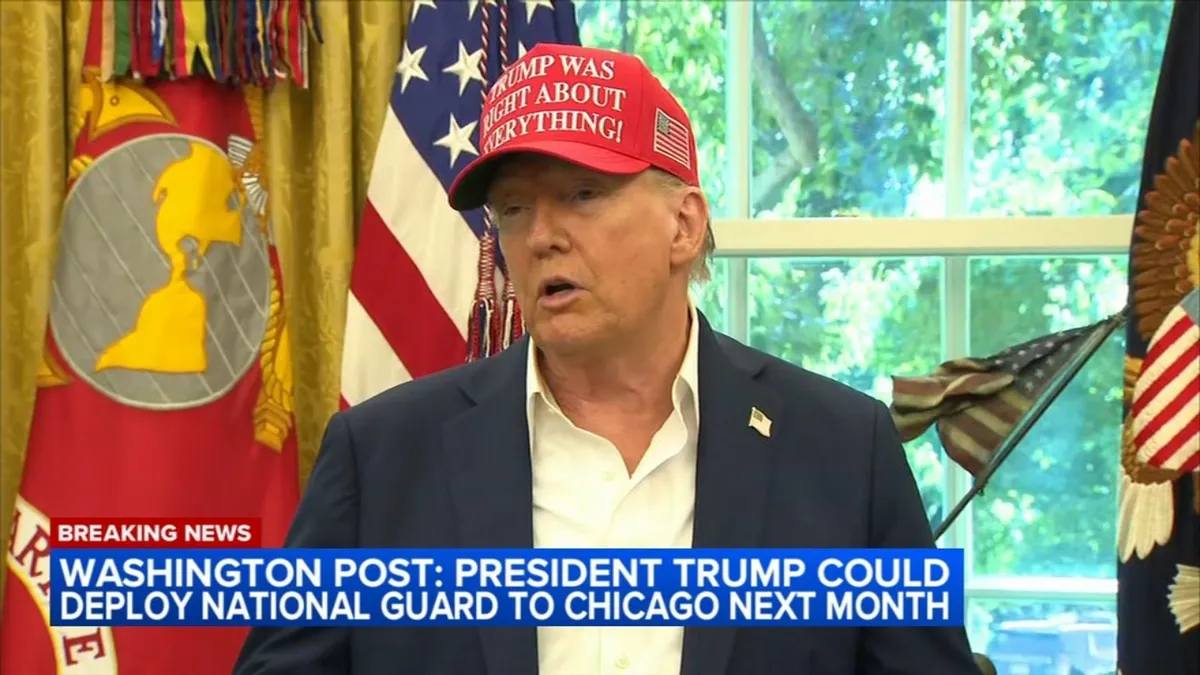
On Saturday, Illinois leaders voiced strong objections following a report indicating that President Donald Trump is planning to deploy federal troops to Chicago. This assertion was based on a report by The Washington Post, which highlighted the administration's intention to expand its crime crackdown efforts after previously deploying the National Guard in Washington, D.C. According to the report, the Pentagon has been developing plans for a military deployment to Chicago for several weeks, potentially involving the mobilization of a few thousand National Guard members by next month.
In a statement regarding the situation, Lt. Governor Juliana Stratton expressed that Trump's intentions are politically motivated and detrimental to the community. "Tonight's reporting from The Washington Post demonstrates what we all know: he is willing to go to any lengths possible to create chaos for more political power—no matter who gets hurt," Stratton stated. She emphasized her commitment to reforming the criminal legal system in Illinois, noting that crime rates in Chicago are decreasing and there is no justification for federal intervention.
Illinois Governor JB Pritzker also weighed in, asserting that the state has not received any requests for assistance from the federal government and has not sought federal intervention. "The safety of the people of Illinois is always my top priority," Pritzker said. "There is no emergency that justifies federalizing the Illinois National Guard or sending active duty military into our communities. This is an attempt by Trump to manufacture a crisis and distract from the real issues facing working families."
During a block party on the same day, Chicago Mayor Brandon Johnson addressed the ongoing issue of crime in the city. He emphasized that even one shooting or homicide is too many, stating, "This block club today is a powerful reminder of how much work we have to do." Johnson highlighted the positive aspects of Chicago's community, asserting that the narrative being pushed by the federal government is misleading. "We invest in one another because we know that we are our best keepers of one another," he added.
On Friday, Trump indicated during a White House briefing that Chicago would likely be the next target of his administration's crime-fighting efforts, alongside issues of homelessness and illegal immigration. He suggested that the city could receive a similar military presence to that seen in Washington, D.C., where he deployed 2,000 troops. "Residents in Chicago are screaming for us to come," he claimed, reinforcing his negative portrayal of the city as "a mess."
Legal analysts, including ABC7 Chief Legal Analyst Gil Soffer, noted that while activating the National Guard may face legal challenges, such actions are becoming increasingly common. Soffer remarked, "Until a year ago, you could count on one hand the number of times the National Guard has been activated. Now, we see it happening in Los Angeles and potentially in Chicago." Mayor Johnson responded to Trump’s comments by stating that his approach is "uncoordinated, uncalled for, and unsound," asserting that Trump's motives are politically driven rather than focused on genuine crime reduction.
Despite Trump's claims that Chicago is a dangerous city, the latest crime data analyzed by the ABC7 data team indicates a decrease in overall crime, violent crime, and property crimes compared to the previous year. As tensions rise over the potential deployment of federal troops, Chicago's leadership remains committed to addressing crime through community engagement rather than military intervention.
As the situation develops, ABC7 will continue to provide updates and further insights into the implications of Trump's proposed actions for the city of Chicago and its residents.